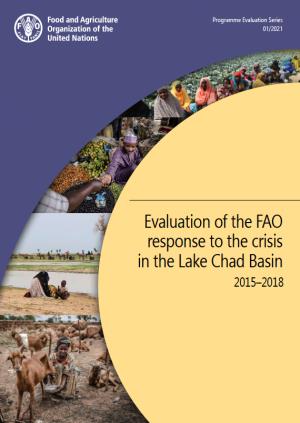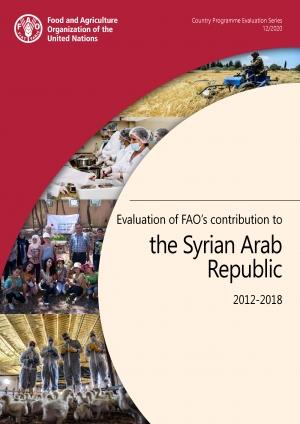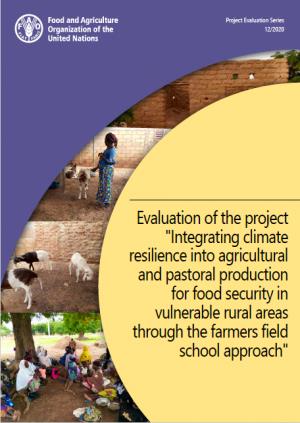Completed evaluations

Evaluation of FAO/USAID Emerging Pandemic Threats Programme – Phase II (EPT-2)
10/02/2021
FAO has been involved in the Emerging Pandemic Threats Programme (EPT-2), funded by USAID since 2014. The programme sets out to minimize impact of existing global pandemic threats and to detect, respond to and improve prevention of emerging threats.

Evaluation of FAO’s role and work on antimicrobial resistance (AMR)
03/02/2021
Antimicrobial resistance (AMR) is the ability of microorganisms to fight antimicrobial compounds, reducing the efficacy of treating diseases in humans, animals, and plants. AMR risk is outpacing human population growth, owing to misuse of antimicrobials in large quantities in food systems, and is a serious threat to food security and sustainable development.

Evaluation of FAO's country programme in Tunisia 2016–2020
01/02/2021
The evaluation of the FAO Country Program in Tunisia (2016-2020) examines the relevance of FAO's strategic positioning in relation to the country's priorities and the Organization's comparative advantages as well as FAO's contributions to the expected results in the five priority areas of the Country Programming Framework (CPF) and FAO Strategic Objectives. [French only]

Evaluation of the FAO response to the crisis in the Lake Chad Basin 2015‒2018
30/01/2021
Forty-nine million people live in the Lake Chad region, exploiting its rich natural resources and relatively constant supply of water, fodder and fertile land all year round. The area used to be a food production hub, with local markets supplying produce to Cameroon, Chad, the Niger and Nigeria.

Evaluation of the Information on Nutrition, Food Security and Resilience for Decision Making (INFORMED) Programme
29/01/2021
The INFORMED programme, implemented by FAO from 2015 to 2019, was designed to contribute to “increasing the resilience of livelihoods to threats and crises and contributing to the reduction of food insecurity and malnutrition”. The programme’s increased focused on Early Warning for Early Action (EWEA) was very relevant to fill existing gaps with a comparative advantage for FAO in slow onset and food chain crises contexts.

Evaluation of the project “Strengthening the adaptive capacity and resilience of rural communities using micro watershed approaches to climate change and variability to attain sustainable food security in Cambodia”
29/01/2021
Cambodia is among the Least Developed Countries that continue to struggle with serious environmental issues, among which are climate change, water resources and land degradation. The project, implemented from 2014 to 2020, contributed to build the adaptive capacity of rural communities and reduce their vulnerability to climate change through micro-watershed management and climate resilient agriculture practices through interventions at national, sub-national and community levels.

Evaluation of the project “Enhancing the contribution of small scale fisheries to food security and sustainable livelihoods through better policies, strategies and initiatives"
29/01/2021
The Voluntary Guidelines for Securing Sustainable Small-Scale Fisheries in the Context of Food Security and Poverty Eradication are the first international instrument dedicated entirely to the immensely important small-scale fisheries sector. The project is part of the FAO Umbrella Programme for the promotion and application of the Guidelines.

Evaluation of FAO’s contribution to the Syrian Arab Republic 2012-2018
18/12/2020
The Syrian crisis has caused intense and sustained levels of violence in the country, which included large-scale destruction of agricultural infrastructure and disruption of all components of the food system. A total of 9.3 million people in the country are facing severe acute food insecurity. During the period subject to evaluation (2012-2018), FAO interventions targeted displaced and hosting households affected by the conflict across the country.

Evaluation of the project "Integrating climate resilience into agricultural and pastoral production for food security in vulnerable rural areas through the farmers field school approach"
18/12/2020
The project, implemented by FAO from May 2015 to August 2020, aimed to “enhance the capacity of Burkina Faso’s agricultural and pastoral sectors to cope with climate change, by mainstreaming climate change adaptation (CCA) practices and strategies into on-going agricultural development initiatives and agricultural policies and programming and upscaling of farmers adoption of CCA technologies and practices through a network of already established farmer field schools (FFS)”.

Real-time evaluation of FAO’s response to desert locust upsurge 2020–2021: Phase I
14/12/2020
Over the course of 2020, the most devastating Desert Locust upsurge of the past 25 years spread across parts of the Middle East, the greater Horn of Africa, and southwest Asia. The upsurge posed an unprecedented risk to livelihoods and food security in some of the most food insecure countries in the world.
